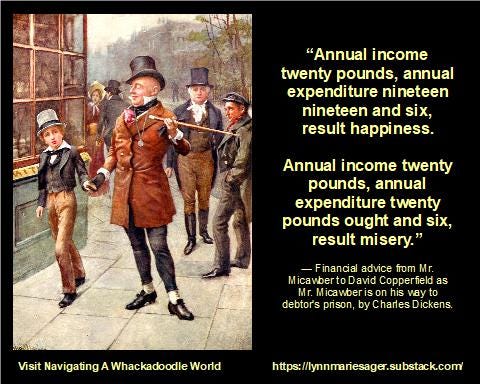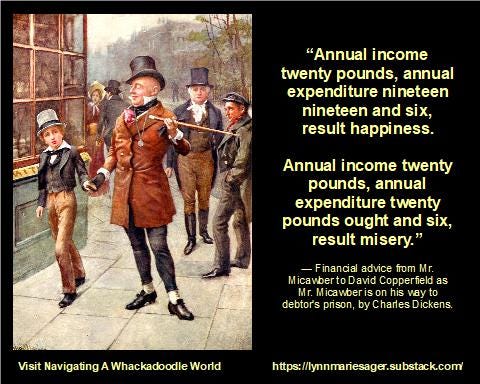Navigating a Whackadoodle World: Episode 68, The Power of Entropy, and The many tools at our disposal in our fight against it.
A Whackadoodle review of Entropy, also known as the tendency of everything to run down and eventually become inert unless you do something about it.

“I don’t know why you always struggle over writing posts for guidepost eleven,” she told me at the end of our tutoring session one day. “Writing about the Power of Entropy should be one of the easiest of the guideposts to write about.”
“Oh yeah,” I snorted. “You wanna write the thing if it’s so easy?”
“Sure,” she waived her hand dismissively. “All you gotta do is remind people that they have six major life assets that they need to nourish in order to keep them from running down and eventually becoming inert.”
“Oh, is that all?”
“Okay,” she shrugged with resignation. “Maybe you should include their names. But that’s simple enough. Just list them: Body, Mind, Spirit, Environment, Finances, and Relationships.”
“So, there’s no need to say anything about how to nourish them?”
“You’ve already explain all that in your book,” she waived her hand again.
“With that kind of logic, all I have to do every week is just refer people to the appropriate chapter in my book. Where’s the fun in that?”
“Fine, you could put in some stuff. Like for the mind you could post a link to that neurologist lady you like so much. Didn’t she just post an article about how to keep our brains healthy in old age?”
“Are you by any chance referring to Doctor Julie Fratantoni?”
“Yeah, that’s her.” She nodded excitedly. “You could just post a link to her article.” She watched me search for the article for several minutes before pushing me aside with a, “Here let me do it…”
“Et voila,” she said raising up both hands in victory. “There you go; tips for nourishing your mind done.”
“You keep adding links, and readers will be so busy reading other article, they'll never finish this one,” I objected.
“Hum,” her nose crinkled as she considered my concern. “You can always suggest that they finish reading this article before coming back to the links that they think will be useful.”
“If you say so,” I laughed. “So what do you want to say about nourishing the body?”
“Right,” she scratched her nose. “That’s got three parts: nutrition, rest, and exercise; which also has three parts: cardio, flexibility, and strength.” Reaching for a pad and pencil, she began to take notes. “So for cardio, we could just remind people that it’s anything that raises their heart rate, like dancing, running, swimming, jumping. Then for strength training it’s anything with weights or resistance, and finally flexibility is any kind of stretching, yoga being the most obvious.”
“You might also mention that certain activities like swimming combine all three. And if you bring a friend with you, you can even nourish a relationship.”
“Good, I like that” she said, adding to her notes. “Plus, it’d sort of be like nourishment for your spirit and mind as well, so that’s like nourishing,” she counted on her fingers, “six things at once.” She bent to write more. “Okay, now rest is obvious, you need to get enough sleep. I think we should post a link to that article you sent me on the importance of sleep, especially for that stuff at the end of the article about how some popular sleep aids may interfere with our glymphamacallits.”
“You mean our glymphatic system,” I laughed some more.
“Right,” she nodded. “I just remember it as the system that’s in charge of waste removal in our bodies. I think we should post the article as a warning for people who take sleeping pills.”
“As you wish, but remember that it’s still a new theory and somewhat controversial.” It took a few minutes to find the article, then she posted it.
Once she was done, I suggested, “Don’t forget that rest is also about taking frequent breaks. There’s evidence that rushing from one task to the next, or working nonstop without taking breaks, affects memory. We actually need those breaks to decompress and get our thoughts in order.”
“Cool,” she jotted that down. “So that leaves diet. For that we could post some of those Blue Zone Recipes, or just remind people about that MASTERed Goal you gave me a few weeks ago where I’m supposed to eat thirty different plants a week.”
“How’s that going by the way?”
“Pretty good,” she shrugged. “I don’t always get to thirty, but I’m definitely making better choices because of the goal.” She looked down at her notes. “Okay, so we’d done body and mind, so next is spirit.” She looked up. “That would be stuff like meditating, prayer, laughter, moments of gratitude and awe. Stuff like that right?”
“And spending time in silence. Don’t forget the power of silence.”
“What’s that Deepak Chopra quote again? The one about meditating?”
“Do you mean, the one where he says, ‘our true nature does not lie within our thoughts but within the gaps between our thoughts; and that it is within those gaps that we can sometimes glimpse the depths of our divine nature.’ Or the one where he describes meditation as ‘going into the gaps between our thoughts, becoming a silent witness to those gaps, and allowing those gaps to deepen and expand until we realize that we exist independently from our thoughts’?”
She looked at me strangely, “I suppose either one would do.” She gave her head a shake. “Okay, then, so, I suppose next we have finance.”
“Oh, I’ve got one for that.” This time I moved her away from the computer and sat down. “It’s one of my favorite Dickensian quotes. I’ve been looking for an excuse to share it.” I finally found what I was looking for and sat back to let her look:
She read the quote over my shoulder, “‘Annual income twenty pounds, annual expenditure nineteen nineteen and six, result happiness. Annual income twenty pounds, annual expenditure twenty pounds ought and six, result misery.’ Ha, that’s pretty good,” she grinned. “And isn’t there something in your book about learning to buy more assets and less consumables?”
“If you add that piece of advice, you’re going to have to explain it a bit.”
“Well, aren’t assets anything that increases in value, while consumables get consumed and are gone.”
“And can you name a few good investments?
“Well,” she thought for a moment. “Obviously there’s stocks and bonds and stuff like that, but you could also invest in people, or education, or the environment, even yourself.”
“Nice,” I grinned. “So what’s left?”
She looked down at her notes. “Environment and relationships.” She looked up, “Environment can be the big stuff like going green and recycling, but it’s also in the small stuff, like checking to see if your car needs oil, or your freezer needs defrosting. Maintenance stuff like that, right?”
“Right,” I confirmed. “Basically, we need to budget time and resources to maintain those things we care about, or need.
“So that leaves investing in people and relationships.” She began tapping the pencil against her lips. “Hang on, don’t you have a whole section about ways to feed relationships?” she asked, reaching for my book. Flipping through the pages, she added, “Yeah, here they are: time, listening, understanding, integrity, clear expectations, boundaries, kindness, sensitivity, honored promises, choice, recognition and desire.” She looked up, suddenly glum. “It’s gonna take a whole lot of typing to explain all that.”
I laughed. “Tell you what, you’ve already been a huge help. I’ll take care of the rest.”
“How?”
“I’ll probably just create a post with an excerpt from that part of the chapter then post a link here. I mean, why not take advantage of what I’ve already written? It will probably look something like this:”
Her face brightened. “That should take care of it. So that means we’re done for another week.” She reached out for a high five. As I began looking over our work, she added from over my shoulder. “Which of the provisions for feeding a crew would you say is the most important?”
I thought about it. “They’re all are pretty important, but if you were to force me to chose, I’d have to say setting boundaries and clarify expectations.”
“Why them?”
“Because they’re the two most often ignored, and when I think about it, the only times that my relationships have really blown up, it’s been because boundaries weren’t set and expectations weren’t clear. I think it’s like that for a lot of people. We just expect others to know our boundaries and expectations because those things feel obvious to us.”
“But they’re not so obvious to others,” she concluded. “Yeah, I think I know what you mean.” She lifted her arms and pushed them out into a stretch so wide I could hear her shoulders crack. With a huge yawn, she added, “So what do you want to do next?”
“Take a nap?” I suggested.
“Nah,” she smiled. “I’d rather go dance walking with you. It’s food for the body, mind, and spirit…






